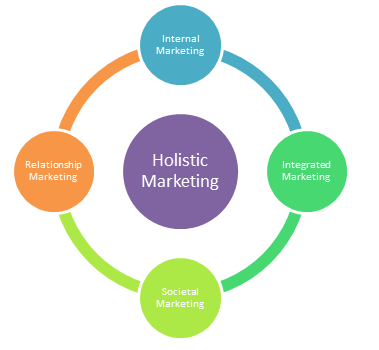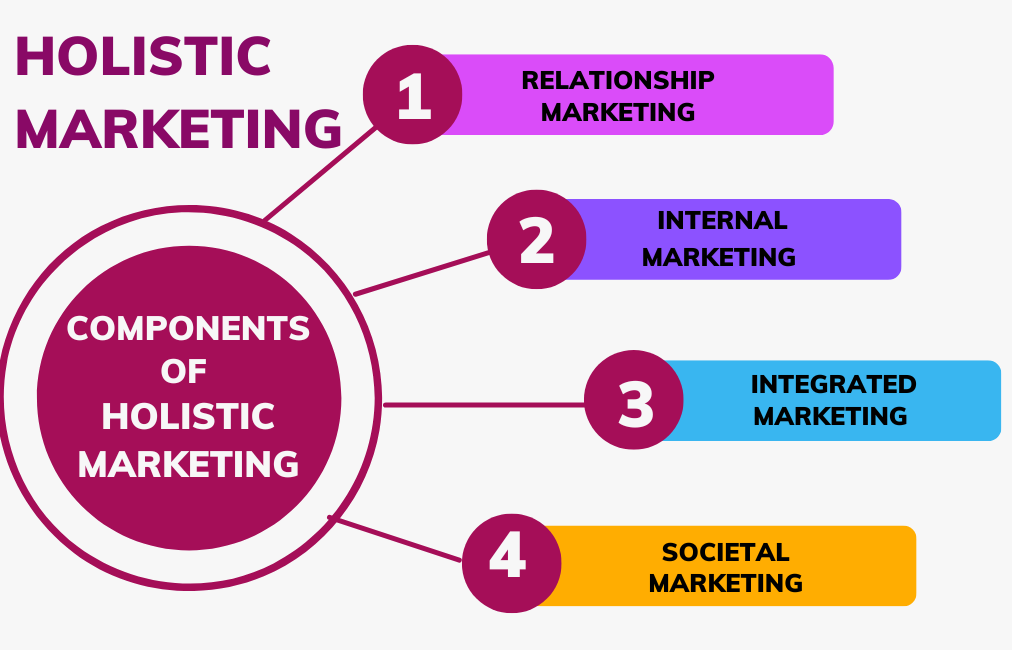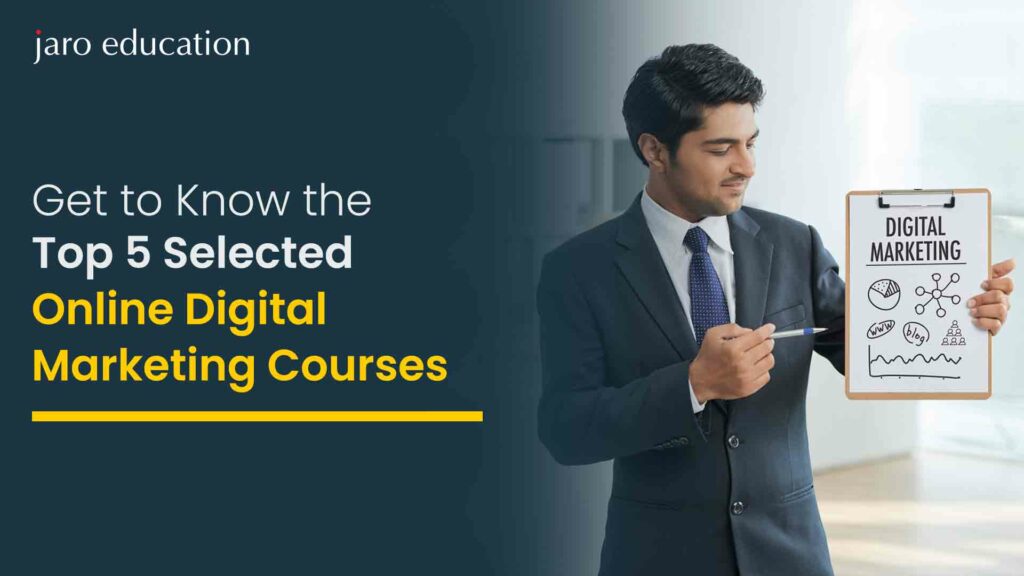What is Holistic Marketing? Meaning, Concepts, Examples
Table of Contents

- jaro education
- 5, July 2024
- 6:40 pm
In today’s fast-paced business landscape, companies are realizing the importance of a cohesive marketing strategy that goes beyond isolated campaigns. Enter holistic marketing—a strategic approach that views the entire business as a unified entity. It ensures all marketing activities work together seamlessly to deliver a consistent brand experience. By integrating diverse marketing efforts and understanding their interconnectedness, businesses can foster stronger customer relationships, maintain brand integrity, and foster sustainable growth.
A holistic approach is essential in modern marketing because it recognizes that every interaction—both internal and external—affects how a brand is perceived. It prioritizes considering all facets of marketing, from customer relations and internal team engagement to integrated communications and social responsibility. This comprehensive view enables businesses to craft more unified and impactful marketing strategies that resonate deeply with their audience.
Join us as we explore holistic marketing: from defining its principles to showcasing practical examples. We’ll delve into relationship marketing, integrated campaigns, internal alignment, and ethical practices, illustrating how these elements combine to form a holistic marketing strategy. By the end, you’ll grasp the power of holistic marketing and its potential to drive sustained success for your business. Let’s build a marketing strategy that stands the test of time.
What is Holistic Marketing?
Holistic marketing is a comprehensive approach that considers the entire business and its various components as interconnected parts of a whole. It integrates all aspects of marketing—relationship marketing, integrated marketing, internal marketing, and socially responsible marketing—to create a seamless and cohesive brand experience. The goal of holistic marketing is to ensure that all marketing activities work together harmoniously, enhancing the overall effectiveness and impact of the marketing strategy.
How Holistic Marketing Differs from Traditional Marketing Approaches:
Traditional marketing approaches often focus on specific elements or campaigns in isolation, such as advertising, promotions, or sales strategies. These methods typically emphasize short-term goals and individual tactics without considering how they fit into the broader picture. In contrast, holistic marketing looks at the big picture and integrates all marketing efforts to create a unified and consistent brand message.
Holistic marketing goes beyond traditional business exchanges by embracing deeper connections and lasting value creation. It values relationships with customers, employees, suppliers, and the community, integrating both external dynamics like market trends and internal elements such as employee morale and organizational culture. This approach ensures sustained engagement and mutual benefit across all stakeholders.
Importance of Integrating Various Marketing Aspects
The interconnectedness of all marketing aspects is crucial for several reasons:
- Consistency and Cohesion: A holistic approach ensures that all marketing messages are consistent across different channels and touchpoints. This consistency strengthens brand identity and helps build trust with customers.
- Enhanced Customer Experience: By integrating all marketing initiatives, businesses create a smoother and more enjoyable experience for customers. From the first touchpoint to ongoing support, every interaction is designed to exceed expectations and build lasting loyalty.
- Improved Efficiency: Holistic marketing enhances coordination and resource management across diverse marketing functions. By breaking down barriers and encouraging teamwork, businesses can streamline operations and maximize overall efficiency.
- Stronger Relationships: Holistic marketing emphasizes building and nurturing long-term relationships with customers, employees, and other stakeholders. This relationship-centric approach leads to higher customer satisfaction, increased employee engagement, and stronger partnerships.
- Adaptability and Resilience: By considering the interconnectedness of various marketing elements, businesses can better adapt to changes in the market environment. A holistic approach allows for more flexible and responsive strategies that can quickly address new challenges and opportunities.
- Social Responsibility: By integrating ethical marketing practices into a comprehensive strategy, businesses prioritize their impact on society and the environment. This not only boosts brand reputation but also meets the rising consumer expectations for sustainable and responsible business operations.
In summary, holistic marketing offers a more integrated, efficient, and effective way to approach marketing in today’s complex and dynamic business landscape. By considering all aspects of marketing and their interconnectedness, businesses can create a cohesive and powerful brand presence that drives long-term success.
Key Concepts of Holistic Marketing
Understanding the key concepts of holistic marketing is essential for developing a comprehensive strategy. This section delves into the core principles, including relationship marketing, integrated marketing, internal marketing, and socially responsible marketing.

Relationship Marketing
Definition and Significance: Relationship marketing is all about nurturing lasting connections and loyalty through prioritizing customer satisfaction and ongoing relationship-building. It’s about personalized interactions that forge a meaningful bond between the brand and its customers, emphasizing long-term engagement over immediate sales targets.
Strategies for Building and Maintaining Customer Relationships:
- Personalized Communication: Tailor messages and offers to individual preferences and behaviors to make customers feel valued.
- Loyalty Programs: Develop programs that reward repeat business and encourage continuous engagement.
- Customer Feedback: We value your input! Share your thoughts to help us enhance our products and services and ensure your satisfaction.
- Community Engagement: Join our social media groups, forums, and events to connect with like-minded individuals and become a part of our growing community.
Benefits of Strong Customer Relationships:
- Increased Retention: Loyal customers are more likely to stay with the brand, reducing churn rates.
- Higher Lifetime Value: Satisfied customers tend to spend more and make frequent purchases over time.
- Word-of-Mouth Promotion: Happy customers are more likely to recommend the brand to others, generating organic growth.
Integrated Marketing
Definition and Importance: Integrated marketing ensures that all marketing activities and communications are unified and consistent across all channels. This cohesive approach strengthens the brand message and maximizes the impact of marketing efforts.
How to Create a Consistent Message Across All Marketing Channels:
- Unified Branding: Maintain consistent visual elements, messaging, and tone across all marketing materials.
- Cross-Channel Coordination: Align campaigns and promotions across different platforms to reinforce the same message.
- Content Strategy: Develop a comprehensive content plan that integrates various marketing efforts and ensures coherence in themes and timing.
Examples of Successful Integrated Marketing Campaigns:
- Coca-Cola’s “Share a Coke” Campaign: This campaign used personalized labels and social media engagement to create a unified and interactive customer experience.
- Apple’s Product Launches: Apple’s integrated marketing efforts ensure that its product launches are consistently promoted across online and offline channels, generating significant buzz and maintaining brand identity.
Internal Marketing
Explanation of Internal Marketing and Its Role within an Organization: Internal marketing focuses on treating employees as internal customers, ensuring they are engaged, motivated, and aligned with the company’s values and goals. A positive internal culture directly impacts the external brand experience.
Strategies to Engage and Motivate Employees:
- Training and Development: Invest in continuous learning opportunities to enhance skills and knowledge.
- Open Communication: Foster transparent communication channels to keep employees informed and involved.
- Recognition and Rewards: Implement programs to recognize and reward employee contributions and achievements.
- Inclusive Culture: Foster an environment of inclusivity where every team member feels respected, valued, and seamlessly integrated into the collective.
Impact of Internal Marketing on External Marketing Efforts:
- Enhanced Customer Experience: When employees feel connected and motivated, they naturally provide outstanding customer service, enhancing the overall customer experience.
- Brand Ambassadors: Motivated employees become advocates for the brand, positively influencing public perception.
- Consistency: A cohesive internal culture ensures consistent delivery of the brand message and values.
Socially Responsible Marketing
Definition and Relevance in Today’s Market: Socially responsible marketing incorporates ethical practices and social values into marketing strategies. It aims to positively impact society and the environment, aligning business operations with broader societal goals.
Strategies for Incorporating Social Responsibility into Marketing Efforts:
- Sustainable Practices: Adopt eco-friendly methods in production, packaging, and distribution to minimize environmental impact.
- Cause Marketing: Partner with nonprofit organizations and support causes that resonate with the brand’s values.
- Transparency: Be open about business practices and their societal impact to build trust with consumers.
- Community Investment: Engage in community projects and encourage employee participation in volunteer activities.
Benefits to Brand Image and Customer Loyalty:
- Enhanced Reputation: Ethical and socially responsible practices improve the brand’s public image.
- Increased Trust: Consumers are more likely to trust and support brands that demonstrate social responsibility.
- Customer Loyalty: Customers who identify with a brand’s values are more likely to remain loyal and advocate for it.
By embracing these key concepts, businesses can develop a holistic marketing strategy that drives sustainable growth, fosters strong relationships, and enhances brand reputation.
Examples of Holistic Marketing in Action
Examining real-world examples of holistic marketing provides valuable insights into its effective implementation. This section highlights how companies like Coca-Cola, Apple, and Unilever successfully integrate various marketing strategies to create cohesive and impactful brand experiences.
Coca-Cola
Overview of Coca-Cola’s Holistic Marketing Strategy: Coca-Cola is renowned for its comprehensive and cohesive marketing strategy that encompasses all aspects of holistic marketing. The brand seamlessly integrates relationship marketing, integrated marketing, internal marketing, and socially responsible marketing to create a unified and engaging brand experience worldwide.
Examples of How Coca-Cola Integrates Relationship, Integrated, Internal, and Socially Responsible Marketing:
- Relationship Marketing: Coca-Cola’s “Share a Coke” campaign transformed its iconic logo with popular names, encouraging people to find and share a Coke with loved ones. By fostering personal connections, this campaign deepened customer loyalty and strengthened bonds with the brand.
- Integrated Marketing: Coca-Cola maintains consistency across all marketing channels, from TV ads to social media. For instance, the “Taste the Feeling” campaign unified its message and visual style across platforms, reinforcing the brand’s values and broadening its appeal.
- Internal Marketing: Coca-Cola prioritizes its employees through robust training and development programs, ensuring alignment with the company’s mission. By nurturing a culture of innovation and collaboration, these efforts resonate through its marketing strategies.
- Socially Responsible Marketing: Coca-Cola is committed to sustainability with initiatives like “World Without Waste,” aiming to recycle a bottle or can for each sold by 2030. This dedication to environmental responsibility not only enhances the brand’s reputation but also connects deeply with environmentally conscious consumers.
Apple
Discussion of Apple’s Approach to Holistic Marketing: Apple’s holistic marketing strategy is centered around creating a seamless and premium customer experience. The brand excels in integrating marketing efforts, engaging employees, and maintaining a strong commitment to social responsibility.
Examples Highlighting Apple’s Integrated and Internal Marketing Efforts:
- Integrated Marketing: Apple ensures that every touchpoint, from product packaging to retail stores to online presence, conveys a consistent and high-quality brand image. The launch of new products, such as the iPhone, is supported by synchronized marketing efforts across multiple channels, including keynote presentations, social media, and advertising.
- Internal Marketing: Apple focuses on employee engagement and motivation through initiatives like Apple University, which offers courses designed to enhance employees’ understanding of the company’s culture and values. This internal alignment ensures that employees are passionate brand ambassadors who deliver exceptional customer experiences.
Unilever
Analysis of Unilever’s Holistic Marketing Practices: Unilever’s holistic marketing approach integrates its commitment to sustainability with efforts to build strong customer relationships and maintain internal alignment. The company leverages its diverse brand portfolio to promote social and environmental responsibility.
Examples of Unilever’s Commitment to Socially Responsible Marketing:
- Socially Responsible Marketing: Unilever’s “Sustainable Living Plan” aims to reduce the company’s environmental footprint while increasing its positive social impact. Brands like Dove and Ben & Jerry’s are known for their campaigns that promote body positivity and social justice, respectively.
- Relationship Marketing: Unilever’s brands engage with customers on issues that matter to them. For example, Dove’s “Real Beauty” campaign fosters a deep connection with consumers by challenging beauty stereotypes and promoting self-esteem.
- Integrated Marketing: Unilever ensures consistent messaging across its brands and platforms. The company uses a combination of traditional and digital marketing to reach a wide audience while maintaining coherence in its brand messaging.
- Internal Marketing: Unilever invests in its employees through initiatives like the Unilever Sustainable Living Lab, which encourages innovation and collaboration. This focus on internal engagement helps align the workforce with the company’s sustainability goals and marketing efforts.
Benefits of Holistic Marketing
Adopting a holistic marketing approach can significantly enhance customer satisfaction, brand consistency, employee engagement, and societal impact. This section highlights the key benefits that make holistic marketing a valuable strategy for long-term business success.
Enhanced Customer Satisfaction and Loyalty
Holistic marketing focuses on nurturing lasting connections with customers. Through personalized communication, loyalty rewards, and ongoing interaction, businesses can greatly boost customer happiness. This fosters strong loyalty, as satisfied customers are more inclined to return, make repeat purchases, and champion the brand. When customers feel appreciated and heard, their emotional bond with the brand deepens, leading to stronger loyalty and greater long-term value.
Improved Brand Consistency and Message Clarity
Holistic marketing centers around crafting a cohesive brand message that resonates consistently across every customer interaction, be it social media, ads, in-store visits, or customer service. This unified approach not only strengthens brand identity but also fosters trust and recognition among customers. By delivering clear and consistent messaging, brands reduce confusion and cultivate a robust, unified image that truly connects with their audience.
Greater Employee Engagement and Productivity
Internal marketing plays a crucial role in comprehensive marketing strategies by prioritizing employees as internal customers. It emphasizes keeping them informed, valued, and aligned with the company’s mission and values. When employees feel appreciated and engaged, their productivity and commitment soar. Engaged employees often exceed expectations in their roles, fostering a positive workplace culture and enhancing customer interactions. This alignment transforms employees into brand advocates, continuously amplifying the company’s message and values across all interactions.
Positive Impact on Society and Brand Reputation
Socially responsible marketing involves incorporating ethical practices and social values into marketing strategies. By addressing issues such as sustainability, fair trade, and community development, businesses can make a positive impact on society. These efforts not only contribute to social good but also enhance the brand’s reputation. Consumers are increasingly favouring brands that demonstrate a commitment to social responsibility. By engaging in socially responsible practices, companies can attract eco-conscious and ethically-minded customers, thereby boosting their brand image and fostering customer loyalty. Positive societal impact, coupled with strong brand reputation, can also lead to increased trust and support from stakeholders, including investors, partners, and employees.

How to Implement a Holistic Marketing Strategy
Implementing a holistic marketing strategy involves integrating all aspects of marketing to create a seamless and cohesive brand experience. This section outlines the steps to develop and execute a holistic marketing plan, tips for ensuring alignment across channels, and methods for measuring the success of your initiatives.
Steps to Develop and Execute a Holistic Marketing Plan
- Define Your Vision and Goals:
- Define a compelling vision that reflects your brand’s values and long-term goals.
- Create SMART goals that are clear, measurable, attainable, relevant, and time-bound to drive your comprehensive marketing approach.
- Conduct a Comprehensive Market Analysis:
- Dive deep into your market, competitors, and audience to grasp the latest trends, needs, and opportunities.
- Pinpoint where your marketing efforts fall short and uncover areas where a comprehensive strategy can make a real difference.
- Develop Integrated Marketing Strategies:
- Create a cohesive marketing plan that includes relationship marketing, integrated marketing, internal marketing, and socially responsible marketing.
- Ensure that each component of your marketing strategy complements and reinforces the others.
- Foster Cross-Departmental Collaboration:
- Establish clear communication channels and collaborative processes across departments such as marketing, sales, customer service, HR, and operations.
- Hold regular meetings and workshops to align all teams with the holistic marketing goals and strategies.
- Invest in Training and Development:
- Support your team with continuous training and growth opportunities, ensuring they grasp and actively contribute to the entire marketing strategy.
- Foster a culture that values ongoing learning and striving for betterment.
- Implement the Marketing Plan:
- Execute your marketing plan across all channels and touchpoints, ensuring consistency in messaging and branding.
- Utilize technology and tools to streamline processes and enhance efficiency.
Tips for Ensuring Alignment and Integration Across All Marketing Channels
- Unified Branding:
- Maintain consistent visual elements, messaging, and tone across all marketing materials, from digital ads to print collateral.
- Content Strategy:
- Develop a content calendar that integrates various marketing efforts and ensures coherence in themes and timing.
- Coordinate content creation and distribution across all channels to reinforce the same message.
- Cross-Channel Coordination:
- Align campaigns and promotions across different platforms to provide a seamless customer experience.
- Use marketing automation tools to manage and synchronize activities across multiple channels.
- Employee Engagement:
- Ensure employees are well-informed and engaged with the marketing strategy. Encourage them to be brand ambassadors.
- Involve employees in brainstorming sessions and strategy meetings to foster a sense of ownership and alignment.
- Customer Feedback Loop:
- Regularly collect and analyze customer feedback to understand their experiences and perceptions.
- Use this feedback to make necessary adjustments and ensure that all marketing efforts remain aligned with customer expectations.
Measuring the Success of Holistic Marketing Initiatives
- Set Clear Metrics and KPIs:
- Define key performance indicators (KPIs) that align with your holistic marketing goals, such as customer satisfaction, brand awareness, employee engagement, and social impact.
- Establish benchmarks to measure progress and success.
- Utilize Analytics Tools:
- Use analytics tools to track and measure the performance of your marketing efforts across various channels.
- Monitor metrics such as website traffic, conversion rates, social media engagement, and customer retention.
- Conduct Regular Reviews:
- Hold regular review meetings to assess the effectiveness of your holistic marketing strategy.
- Analyze data and feedback to identify areas of success and areas needing improvement.
- Adjust and Optimize:
- Be prepared to make adjustments to your strategy based on the insights gained from your measurements and reviews.
- Continuously optimize your marketing efforts to ensure they remain aligned with your goals and deliver the desired outcomes.
- Report and Share Results:
- Document and share the results of your holistic marketing initiatives with all stakeholders, including employees, management, and external partners.
- Use these reports to celebrate successes, learn from challenges, and refine future strategies.
By following these steps, tips, and measurement practices, you can effectively implement a holistic marketing strategy that drives sustainable growth, enhances customer satisfaction, and builds a strong, cohesive brand.
Conclusion
Holistic marketing is an essential approach for businesses aiming to thrive in today’s complex and interconnected market environment. By integrating all marketing activities and considering the interconnectedness of various marketing efforts, businesses can create a cohesive and impactful brand experience. The benefits of holistic marketing are significant: enhanced customer satisfaction and loyalty, improved brand consistency and message clarity, greater employee engagement and productivity, and a positive impact on society and brand reputation.
As businesses strive to excel in an ever-evolving marketing landscape, education plays a pivotal role in equipping aspiring professionals with the right skills and knowledge. For those looking to embark on a journey of comprehensive business education and holistic marketing understanding, the Online BBA Programme at Manipal University Jaipur stands as a beacon of excellence. With its innovative curriculum, expert faculty, and commitment to nurturing future business leaders, this programme paves the way for individuals to thrive in dynamic and competitive business environments. Embrace holistic marketing not just as a strategy, but as a mindset, and embark on a transformative learning experience with Manipal University Jaipur.
Taking a holistic approach to marketing isn’t just about immediate gains; it’s about forging deep connections with customers, empowering teams, and harmonizing all marketing efforts. This strategy not only drives current success but also fortifies brands for sustainable growth in a dynamic market.
As marketing evolves, embracing a comprehensive strategy becomes vital. Holistic marketing enables businesses to stay nimble, responsive, and strategic in the face of change. By committing to this approach, companies unlock their true potential, delivering meaningful value to customers, employees, and society, all while achieving enduring goals.
Recent Blogs
Future of Programming Languages You Need to Know
Top 10 Exclusive Business Analytics Tools
What Is Financial Analytics & Why Is It Important?
10 Remarkable Reasons Why You Should Get an Executive MBA
Top Objectives of Financial Management: Unleash the Growth
Get to Know the Top 5 Selected Online Digital Marketing Courses
Popular courses
Admission Open

Executive MBA – IIM Mumbai
- Duration: 2 Years
- Application Closure Date: 20th December 2024
Admission Open

Executive Development Programme in Digital HR Transformation & AI-Driven HR Analytics – XLRI Jamshedpur
- Duration: 10 Months
- Application Closure Date: 29th January 2025
Admission Open

Chief Product Officer Programme (CPOP) – IIM Indore
- Duration: 8 Months
- Application Closure Date: 31st December 2024












